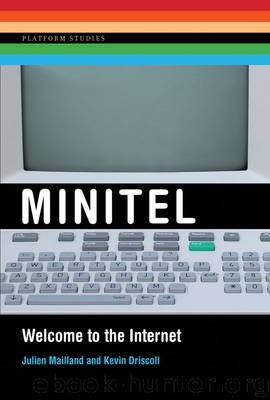Minitel by Julien Mailland & Kevin Driscoll

Author:Julien Mailland & Kevin Driscoll
Language: eng
Format: epub
Tags: France; history; platform studies; Internet; online; STS; computer science; media; Internet studies; network; design; technology; e-commerce; digital; innovation; policy; politics; Europe; French; business; government; state; private sector
Publisher: The MIT Press
Published: 2017-06-30T04:00:00+00:00
Conclusion
Cesson-Sévigné may not be as sunny as Silicon Valley, but the public–private partnership that undergirds the French telecom capital is not all that different from the military-industrial complex that initially spurred the growth of the US tech capital. Over the years, many scholars have come to see Minitel as an icon of centralized State planning, the epitome of dirigisme, and the ideological opposite of US entrepreneurialism. Not only is this portrayal inaccurate—dirigisme implies a certain micromanagement that is absent from the Minitel case—but it also overlooks important decentralized characteristics of the Minitel architecture that are useful for thinking with greater nuance about the openness of the systems we rely on today. Indeed, while some aspects of Minitel were kept under centralized State control, the provision of end user services was left to independent enterprises positioned at the edges of the network. The State further stimulated the growth of this private sector by providing billing and account services, high-quality technical documentation, training in the design and management of information resources, and detailed research on large-scale public videotex experiments. By combining elements of centralization and decentralization, the architecture of Minitel invited mass-scale participation as well as encouraged widespread entrepreneurship and experimentation.
The plan to create Minitel was motivated in part by a vision of telematics put forth in 1978 by Nora and Minc. The two researchers hoped that by decentralizing the provision of services, French telematics might enable a kind of entrepreneurial “freedom” to unsettle long-standing political traditions in the country, causing “even the most deep-rooted habits and ideologies to lose their validity.”60 On reflection, it seems that while a certain amount of freedom may have been realized at the edges of the network, the system could not wholly undermine the French tradition of centralization.
In 1994, Gérard Théry was tasked by the French prime minister with studying ways in which France could benefit from the development of the international information superhighway. In his report, Théry opined that the Internet could not successfully develop in France without State sponsorship because it lacked many of the centralized features of Minitel—namely, a comprehensive directory of users along with a reliable system for billing and payment.61 Instead, Théry envisioned that there would be two Internets: “one Franco-German internet [driven by the French and German governments], and another one [the legacy of ARPANET and NSFNET].”62 Théry’s failure to foresee the commercial success of the Internet suggests that he did not believe that a network ecosystem could be viable unless it was designed and managed by a top-down state-like entity. Rather than challenge the political tradition of centralization, the Minitel experience seemed to reinforce a belief that centralization was a necessary precondition for the success of the Internet in France.
Freedom—in the Nora and Minc sense of the term—was felt most strongly at the edges of the Télétel network, among those users and service providers that built and occupied the services that gave life to Minitel. The hybrid architecture offered a generative platform for these private stakeholders to experiment and play with the possibilities of widespread telematics.
Download
This site does not store any files on its server. We only index and link to content provided by other sites. Please contact the content providers to delete copyright contents if any and email us, we'll remove relevant links or contents immediately.
| Anthropology | Archaeology |
| Philosophy | Politics & Government |
| Social Sciences | Sociology |
| Women's Studies |
The Secret History by Donna Tartt(19002)
The Social Justice Warrior Handbook by Lisa De Pasquale(12177)
Thirteen Reasons Why by Jay Asher(8874)
This Is How You Lose Her by Junot Diaz(6857)
Weapons of Math Destruction by Cathy O'Neil(6249)
Zero to One by Peter Thiel(5768)
Beartown by Fredrik Backman(5718)
The Myth of the Strong Leader by Archie Brown(5482)
The Fire Next Time by James Baldwin(5409)
How Democracies Die by Steven Levitsky & Daniel Ziblatt(5200)
Promise Me, Dad by Joe Biden(5132)
Stone's Rules by Roger Stone(5065)
A Higher Loyalty: Truth, Lies, and Leadership by James Comey(4937)
100 Deadly Skills by Clint Emerson(4900)
Rise and Kill First by Ronen Bergman(4761)
Secrecy World by Jake Bernstein(4727)
The David Icke Guide to the Global Conspiracy (and how to end it) by David Icke(4685)
The Farm by Tom Rob Smith(4489)
The Doomsday Machine by Daniel Ellsberg(4474)
